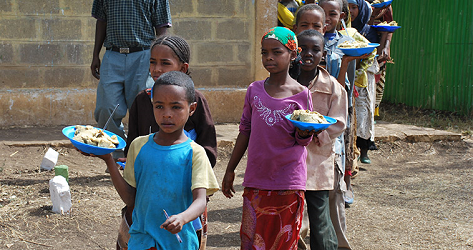The Government of Germany and the UN children organization (UNICEF) today hand over 30 vehicles to the Government of Ethiopia in support of the country’s mobile health and nutrition services program. The vehicles are donated to the regions of Somali and Afar health bureaus.
The Somali Region received 19 vehicles and the remaining 11 went to Afar. The vehicles will be used by Mobile Health and Nutrition Teams in the two regions to reach children in remote and hard-to-reach areas with essential lifesaving services.
It is expected that the cost of running the teams will also be significantly reduced since it will cut out vehicle rentals.
“Child health and nutrition indicators in these two regions are the lowest in the country,” said Gillian Mellsop, UNICEF Representative in Ethiopia. “With this contribution, together with the Government of Ethiopia and other partners, we will ensure that every child is reached with essential and lifesaving health and nutrition services. No child should be left behind because of where they live or their socio-economic circumstances.”
“In German Development Cooperation, we always strive to provide context specific support that reaches those most in need,” said Hanspeter Schwär, Head of Cooperation at the German Embassy.
“The mobile health and nutrition units are a perfect example of leaving no child behind. Strengthening resilience is a challenge that we can only tackle together. We are very glad to have UNICEF as a strong and trusted partner for our development bank KfW to work with and together with the Ethiopian Government to build resilient health systems. We all want the same: healthy parents and healthy children.”
Mobile Health and Nutrition Teams were established by the Government of Ethiopia in 2006 to provide health, nutrition, and water and sanitation services to vulnerable communities in inaccessible and remote areas. In recent years, the teams have played a key role in reaching pastoralist and agro-pastoralist communities affected by droughts.
The UNICEF supported Mobile Health and Nutrition Teams have grown from an initial 16 in 2006 to the current 49, all based in Somali and Afar regions. In 2018, the teams provided 500,000 medical consultations in the two regions, thus ensuring that malnutrition and other diseases were prevented or treated in a timely manner.
The donation aims to ensure that pastoralists and vulnerable communities in Afar and Somali regions access quality, life-saving, and essential health and nutrition services through Mobile Health and Nutrition Teams (MHNTs) intervention. Also, this support will ensure sustainability of this important intervention and significantly reduce cost.
Ethiopia has seen a steady reduction in stunting from 58% in 2000 to 38% in 2016, in the percentage of underweight children from 41 per cent to 24% during the same period, and in wasting from 12% to 10%, according to UNICEF.
MHNTs provide basic health, nutrition and emergency referral services to populations living in hard-to-reach drought-prone districts with limited or no access to public or private health care services.
The two major functions of MHNT are the assessment, classification and management of common diseases and priority health problems with special attention to children and mothers, and nutritional screening and treatment of severe acute malnutrition of all children under age 5 and pregnant and lactating women.
UNICEF: works in some of the world’s toughest places, to reach the world’s most disadvantaged children. Across 190 countries and territories, we work for every child, everywhere, to build a better world for everyone.

